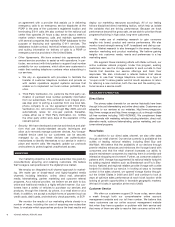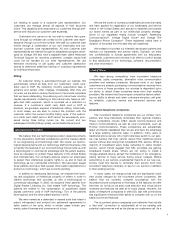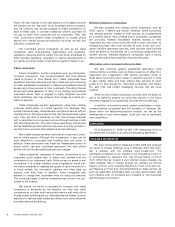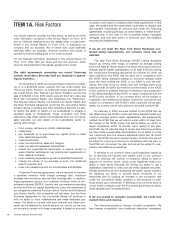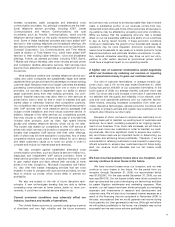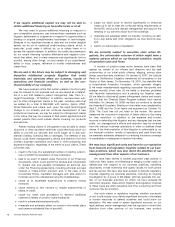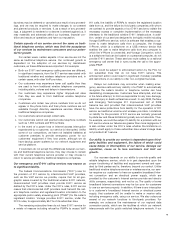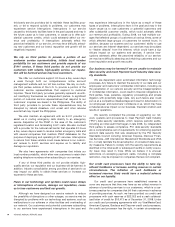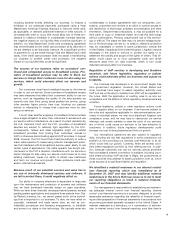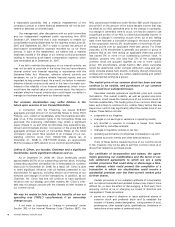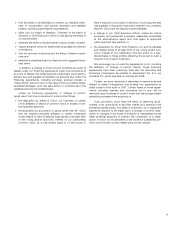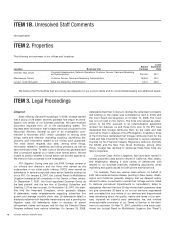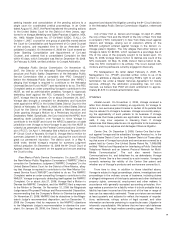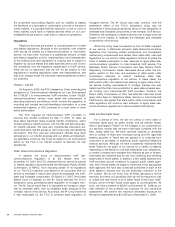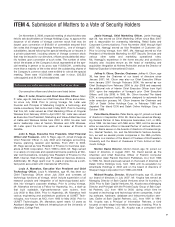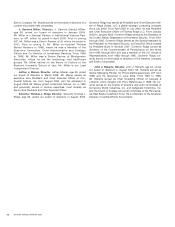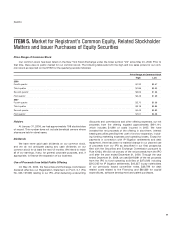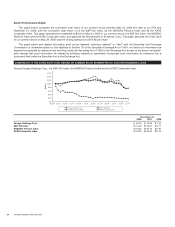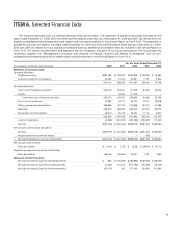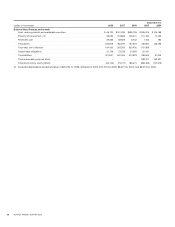Vonage 2008 Annual Report Download - page 24
Download and view the complete annual report
Please find page 24 of the 2008 Vonage annual report below. You can navigate through the pages in the report by either clicking on the pages listed below, or by using the keyword search tool below to find specific information within the annual report.a reasonable possibilit
y
that a material misstatement o
f
the
company’s annual or interim financial statements will not be pre-
v
ente
d
or
d
etecte
d
on a t
i
me
ly b
as
i
s.
Our management, after discussions with our audit committee
and our independent registered public accounting firm, BD
O
S
eidman LLP, determined that it was necessar
y
to restate our
consolidated
f
inancial statements
f
or the quarters ended June 30,
2007 and
S
e
p
tember 30, 2007 in order to correct the amount o
f
s
tock-based compensation expense recorded b
y
us for those
p
eriods. In light o
f
the restatement, we believe that a materia
l
weakness existed in the design of our internal control procedure
s
r
e
l
at
i
n
g
to recor
di
n
g
stoc
k
-
b
ase
d
compensat
i
on expense, w
hi
c
h
was remediated as o
f
December 31
,
2007.
I
f we fail to maintain the adequacy of our internal controls, w
e
m
a
y
not be able to conclude in the
f
uture that we have e
ff
ective
internal control over
f
inancial reporting in accordance with th
e
S
arbanes-
O
xley Act. Moreover, effective internal controls ar
e
n
ecessar
yf
or us to produce reliable
f
inancial reports and are
important to help prevent
f
raud. As a result, our
f
ailure to maintai
n
effective internal controls could result in the loss of investor con-
f
idence in the reliabilit
y
o
f
our
f
inancial statements, which in tur
n
could harm the market value o
f
our common stock. An
yf
ailure t
o
m
aintain effective internal controls also could impair our ability t
o
m
ana
g
e our business and harm our financial results.
Our common stockholders ma
y
suffer dilution in the
future upon exercise of our
C
onvertible Notes.
I
n connection with the Financin
g
, we issued $18,000
a
gg
re
g
ate principal amount of Convertible Notes to Silver Point
Finance, LLC, certain of its affiliates, other third
p
arties and affili
-
ates of us. If the conversion ri
g
hts in the
C
onvertible Notes are
exercised, the exercisin
g
noteholders may obtain a si
g
ni
f
ican
t
equity interest in us and other stockholders may experience sig-
n
ificant and immediate dilution. Conversion of the entire $18,000
a
gg
re
g
ate principal amount of Convertible Notes at the initial
conversion rate would have resulted in an increase o
f
our out
-
s
tandin
g
common stock from 156,647,943 shares
(
as o
f
December 31, 2008) to 218,716,909 shares, an approximat
e
3
9.6
%
increase or 28
%
dilution to our common stockholders
.
Jeffrey A. Citron, our founder, Chairman and a si
g
nificant
stockholder, exerts si
g
nificant influence over us
.
A
s of December 31, 2008, Mr. Citron beneficiall
y
owne
d
approximately 36.5
%
o
f
our outstanding common stock, includin
g
outstandin
g
securities convertible into or exercisable for commo
n
s
tock prior to December 31, 2008. As a result, Mr. Citron is abl
e
t
o exert signi
f
icant in
f
luence over all matters presented to our
s
tockholders for approval, includin
g
election and removal of our
directors and chan
g
eo
f
control transactions. In addition, as our
C
hairman, Mr. Citron has and will continue to have significan
t
i
nfluence over our strate
g
y and other matters. Mr.
C
itron’s inter
-
ests ma
y
not alwa
y
s coincide with the interests o
f
other holders o
f
our common stock
.
We ma
y
be unable to full
y
realize the benefits of our net
operatin
g
loss (“NOL”) carryforwards if an ownership
chan
g
e occurs
.
I
f we were to experience a “chan
g
e in ownership” unde
r
Section 382 of the Internal Revenue Code (“Section 382”), th
e
NOL carr
y
forward limitations under Section 382 would impose an
a
nnual limit on the amount of the future taxable income that ma
y
b
e offset by our N
O
L
g
enerated prior to the chan
g
e in ownership
.
I
f
a chan
g
e in ownership were to occur, we may be unable to use
a
significant portion of our N
O
L to offset future taxable income. I
n
g
eneral, a chan
g
e in ownership occurs when, as of any testin
g
d
ate, there has been a cumulative chan
g
e in the stock ownership
of
the corporation held by 5
%
stockholders o
f
more than 50 per
-
c
enta
g
epo
i
nts over an app
li
ca
bl
et
h
ree-year per
i
o
d
.
F
or t
h
ese
p
urposes, a 5
%
stockholder is
g
enerally any person or
g
roup o
f
p
ersons that at any time during an applicable three-year period
has owned 5% or more of our outstandin
g
common stock. I
n
a
ddition, persons who own less than 5
%
o
f
the outstandin
g
c
ommon stock are grouped together as one or more “publi
c
g
roup” 5% stockholders. Under
S
ection 382, stock ownership
w
ould be determined under complex attribution rules and
g
en-
e
rally includes shares held directly, indirectly (though intervenin
g
e
ntities
)
and constructively
(
by certain related parties and certai
n
unrelated parties actin
g
as a
g
roup).
T
he market
p
rice of our common stock has been and ma
y
c
ontinue to be volatile, and purchasers o
f
our common
s
toc
k
cou
ld i
ncur su
b
stant
i
a
ll
osses.
S
ecurities markets experience significant price and volum
e
fluctuations. This market volatility, as well as general economi
c
c
onditions, could cause the market price of our common stock t
o
f
luctuate substantially. The trading price o
f
our common stock has
b
een, and is likely to continue to be, volatile. Many factors that ar
e
b
eyond our control may si
g
nificantly affect the market price of ou
r
s
hares. These
f
actors include:
>
j
u
d
gments
i
n our
li
t
i
gat
i
on;
>
ch
anges
i
n our earn
i
ngs or var
i
at
i
ons
i
n operat
i
ng resu
l
ts;
>
a
ny shortfall in revenue or increase in losses from level
s
e
xpecte
dby
secur
i
t
i
es ana
ly
sts;
>
ch
an
g
es
i
nre
g
u
l
atory po
li
c
i
es or tax
l
aw;
>
o
peratin
g
per
f
ormance o
f
companies comparable to us; and
>
g
eneral economic trends and other external
f
actors
.
I
f
any o
f
these
f
actors causes the price o
f
our common stoc
k
to fall, investors may not be able to sell their common stock at or
a
bove their respective purchase prices.
O
ur certificate of incorporation and bylaws, the agree-
m
ents governing our indebtedness and the terms o
f
cer-
t
ain settlement a
g
reements to which we are a part
y
c
ontain provisions that could delay or discoura
g
e a take-
o
ver attem
p
t, which could
p
revent the com
p
letion of
a
t
ransact
i
on
i
nw
hi
c
h
our stoc
kh
o
ld
ers cou
ld
rece
i
ve
a
s
u
b
stant
i
a
l
prem
i
um over t
h
et
h
en-current mar
k
et pr
i
ce
fo
rth
e
ir
s
h
a
r
es.
C
ertain provisions of our restated certificate of incorporatio
n
a
nd our second amended and restated b
y
laws ma
y
make it mor
e
d
ifficult for, or have the effect of discouraging, a third party fro
m
a
cquirin
g
control of us or chan
g
in
g
our board of directors and
management. These provisions:
>
p
ermit our board of directors to issue additional shares of
c
ommon stock and preferred stock and to establish th
e
number of shares, series designation, voting powers (if any),
p
references, other special rights, qualifications, limitations or
restrictions of an
y
series of preferred stock;
1
6
VO
NA
G
E ANN
U
AL REP
O
RT 2008


